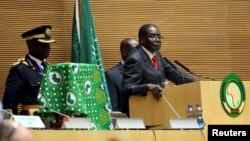More than a week after Zimbabwe President Robert Mugabe delivered his hard-charging speech before delegates attending the 26th African Union Summit, in Ethiopia last week, U.S. based intellectuals from the continent are still gnawing at his demand for reform of the United Nations Security Council.
In an hour-long speech as he ended his tenure as chair of the continental body, President Mugabe argued that Africa’s exclusion from the powerful five-member body of decision makers with veto power, was unjust and acceptable, despite years of pushing.
“We come to the United Nations ceremonial every September, we are there, we pay a lot of money to go there, general assembly we make speeches, we go home, year in year out, but the bosses in the Security Council say you shall never have the powers that we have as permanent members,” President Mugabe said to a loud applause. “And we have asked and asked and asked, and asked and asked, reform, reform the Security Council,” he pursued, to a standing ovation.
President Mugabe and many African leaders have been pushing for at least two countries to be included in the Security Council. President Mugabe suggested that Africa countries could pull out of the 193-member body, if reform is not undertaken, and Africa given more recognition.
“If we decide as we shall certainly do so one of these days, that down with the United Nations, we are not members of it, others are real members of it, we are artificial members of it, and we, we can’t continue to be artificial members of it.”
Many who heard the speech, applauded Mr. Mugabe, saying that reform of the crucial body was long overdue and necessary.
Associate Fellow Emira Woods of the Washington-based Institute for Policy Studies applauded Mr. Mugabe’s persistence on the matter, however she said a mass pull out was unlikely.
“It’s difficult to see 54 of the 193-countries, pulling out.” But, Woods continued, “I do think creating political will around this question of reforming the Security Council to more accurately reflect the world of today is right on point.”
In agreement, analyst Nii Akuetteh of the African Immigrant Caucus, said Africa’s dependency on the world body, is one likely reason for a lack of consensus on such a call by Mr. Mugabe.
“Yes we have 54-countries and we make a big chunk of the (UN) General Assembly but a lot of our countries depend on these external donors for their money,” said Akuetteh. “Frankly, I would be very surprised if Africa takes a united front. I expect some African leaders to be bought behind the scenes by being told if you go along with this we will cut off all your aid.”
The more crucial question of reform, however, said Akuetteh and Woods who participated on a panel discussion, was the political will of the Security Council to open up the body to other countries, including those from Africa.
Quoting African-American civil rights activist, Frederick Douglas who said that “power concedes nothing without a demand,” both analysts concurred that reform of the Security Council would be hard won, if achieved, due to resistance from the members of the crucial body, namely the U.S., Britain, France, China and Russia.
Akuetteh said, “they (members of the UN Security Council) wouldn’t want to do it unless they are forced, to the point where they can’t resist anymore, and they’ll try to compromise,” he said. “I mean much the same way I look at South Africa, you know the apartheid government did not want to give up power when they realized that they had to give up some of it in order not to lose everything.”
Forcing reform said the two, would require a heavy push from all stakeholders from Africa, and a willingness to form strong coalitions and alliances where possible, to ensure enough pressure and representation.
“African countries, both leaders and civil society have to be there to demand the changes that are needed to further reflect the world of the 21st Century and beyond,” said Woods.
While both agreed that reform of the Security Council was a long stretch, both also entertained the question of what would happen if reform did happen.
“I think the question is how many countries, and which countries,” said Woods of the 54-African countries to choose from, presenting a new debate possibility when the time comes.
“You have countries, Algeria and Egypt that were there at the founding of the UN, and so you know are demanding a rightful role now in the Security Council. You have South Africa and Nigeria because of their economic dominance, and you could also Nigeria with its involvement in the UN Peacekeeping and to the extent that it.”
Akuetteh too wondered how much unity Africa, which is divided into four regions including North Africa, would show, when the opportunity to sit among the most powerful emerges.
“I think coming up with a candidate everybody can rally behind, is going to be a challenge in itself,” said Akuetteh. “It’s not impossible. But we do have regional rivalries, we do have rivalries between countries even if it is not polite to admit if outside of our continent.”
With the possibility of reform still on the discussion table, Woods and Akuetteh said for now, the best Africa can do is continue to show solidarity and consensus when pitted against the west, as they did during the recent climate change discussions in Paris, France.




